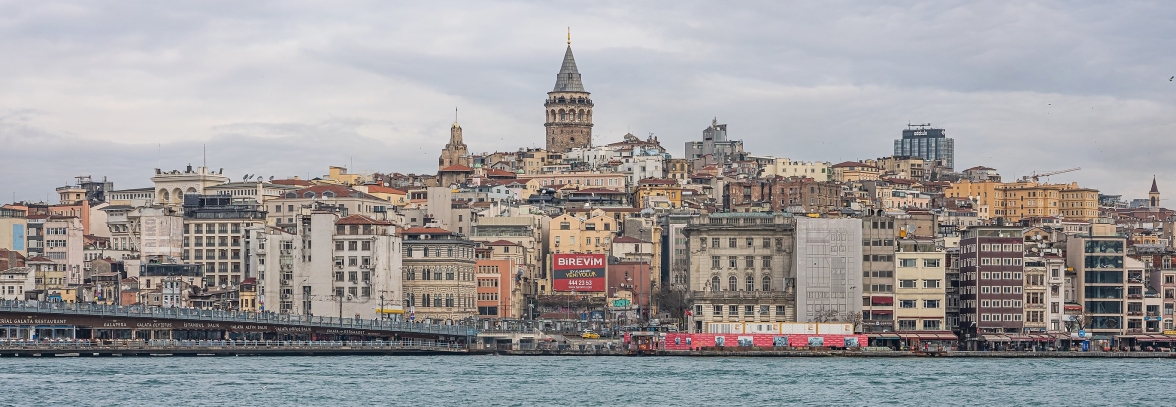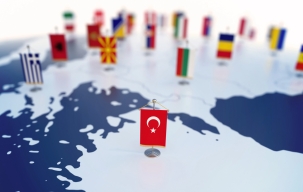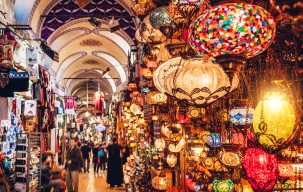
Turkey (TR)
Capital
Ankara
Population
79.5 million
Government
Republic headed by President
Head of state & government
President Recep Tayyip Erdoğan
National Day
October 29th
Turkey's Ambassador to the UK
H.E Mr Osman Koray Ertaş
Embassy of Turkey, 43 Belgrave Square, London, SW1X 8PA
UK's Ambassador to Turkey
H.E Ms Jill Morris CMG
British Embassy Ankara, Şehit Ersan Caddesi 46/A, Çankaya, Ankara, Turkey
Turkey is unique in the Middle East because of its geography and culture, in that it is both in Asia and Europe. Although much of the Middle East has been linked by trade routes for centuries, Turkey maintains its status as a prominent nation of global crossroads, given it borders the Middle East, the eastern Mediterranean, the Caucuses and the Balkans and has a coastline of approximately 4,000 miles that includes strategically crucial waterways such as the Turkish straits.
Rome and Byzantium
Rich in classical tradition, the area comprising modern Turkey has remained geopolitically crucial for millennia. In 334 BC, Alexander the Great crossed the Hellespont into Turkey with his army to begin his conquest of Asia Minor and then eventually all of the mighty Persian Empire.
In 188 BC, Rome annexed the entirety of Asia Minor and in 334 AD, the Emperor Constantine celebrated the building of a new city, Constantinople, which eventually became the capital for the Roman Empire of the East and, subsequent to the fall of Rome in the West, the heart of the Byzantium Empire for the next 1,000 years. Eventually, in 1453, Constantinople, and other remnants of Byzantium, were conquered by the Ottomans under Mehmed II after an epic battle.
Constaninople (modern day Istanbul) was a key centre in development of early Christianity and Istanbul today remains the home of the Ecumenical Patriarch of Constantinople, the widely-regarded spiritual leader for 300 million Eastern Orthodox Christians.
Ottomans and Ataturk
Following the fall of the Christian Byzantine Empire in the Middle Ages, the Ottoman Empire expanded rapidly throughout Europe and the Middle East, remaining a global player and massively influencing the culture and economy of the region until the 20th century. Equally influential to the region was the fall of the Ottoman Empire, to both Turkey and the region.
Turkey grew into a secular republic after the Ottoman Empire collapsed and the last Sultan was sent into exile. The visionary ideology of Mustafa Kemal Ataturk began to shape Turkey into a fundamentally secular and modern democratic country, whilst the Empire’s former territories were partitioned under the Treaties of Sèvres, the effects of which can still be attributed to difficulties in the Middle East today.
With such a multifaceted and important history, the debate within the country on how exactly the Turkey of the 21st century conducts and defines itself rages on. For many Turks, the visionary secularism of Ataturk is an immovable feature of Turkish government, setting it apart from its Middle Eastern neighbours.
Islam and Erdoğan
But for others, Sunni Islam is an equally inseparable part of the Turkish identity, which deserves to be reflected in its government and foreign policy. The government of President Recep Tayyip Erdoğan leans strongly with the latter opinion, enacting cultural, judicial and parliamentary reforms that many have labelled as increasingly authoritarian. His government has been criticised for its crackdowns on media outlets that have been critical with him and other actions such as the current attempt to close down the left wing Kurdish peoples' Democratic Party, or HDP.
Asia or Europe?
Interwoven in a complex dialogue over Turkey are other considerations: is Turkey more of a European or Asian state? For years, under successive governments, Turkey has tried to join the EU. It first applied in 1987 to join what was then the European Economic Community (EEC). Turkey is in a customs union with the EU but negotiations for full EU membership continue.
The Turkish identity will continue to differ from citizen to citizen and in such a strategic location, these debates will continue to have important consequences for policymakers globally. The relationship between the British and European governments with Turkey has and will continue to play a vital role in the security and economy of both regions.
Also, how can the country best secure itself with so many turbulent regions just beyond its borders? In 2020, Turkey's incursions into northern Syria to combat Kurdish militants brought it military into direct conflict with Syria's. The Syrian civil war has also put enormous pressure on Turkey. It currently hosts an estimated 3.7 million Syrian refugees. President Erdoğan has repeatedly threatened Europe to expect more refugees in his frequent disputes with EU nations.
S-400 missiles and estrangement from the US
Erdoğan's controversial purchase of the S-400 missile ground-to-air system from Russia in 2017 did not endear him to the White House, particularly as the system is designed to down the F-35 jets Ankara was hoping to purchase from the US. So far, Washington has refused to sell Turkey its F-35s in response to the S-400 decision. The issue continues to cause tensions between Turkey and other NATO members, particularly the US.
Turkey's central strategic position, straddling both European and Asian continents, guarantee Turkey's critical role to the stability of both.
Northern Cyprus
In July 1974, Turkey invaded north Cyprus. This followed a coup by both Cypriot and Greek military to install a government that would bring about "enosis", the political union of Cyprus and Greece. Enosis was always opposed by the Turkish Cypriots, who live mainly in northern Cyprus and who now number an estimated 150,000. Turkish Cypriots favoured "Taksim", the division of Cyprus into Greek and Turkish states, which happened de facto following the invasion.
Turkey's invasion led to the creation of the Turkish Republic of Northern Cyprus (TRNC) and a border separating a large area of North Cyprus from the rest of the island, a border that even runs through the Cypriot capital of Nicosia. Repeated attempts by the international community to resolve the Cyprus issue have failed.
As recently as September 2021, Turkey called for international recognition of the TRNC as a sovereign state but this status has yet to be afforded to it by any other nation except for Turkey. The 6 districts making up the TRNC rely heavily on Turkey for security and finance. The UN describes northern Cyprus under the TRNC as territory under Turkish occupation.


